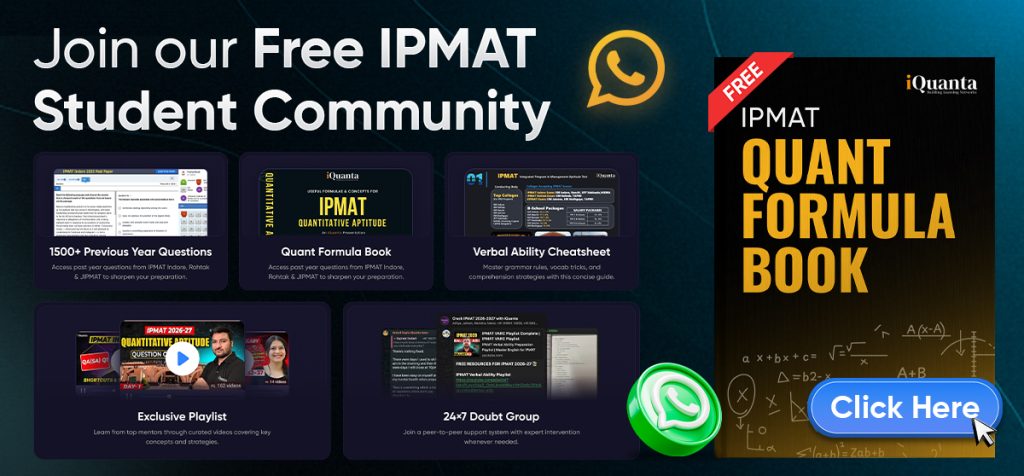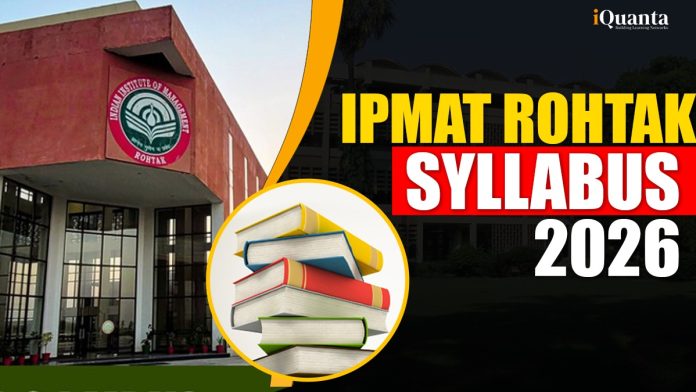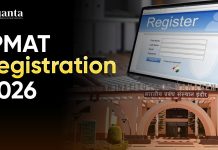IPMAT Rohtak 2026 (Integrated Programme in Management Aptitude Test) is an entrance exam conducted by IIM Rohtak. It is designed for students who wish to enroll in the five-year Integrated Programme in Management (IPM) after completing Class 12. The test evaluates a student’s aptitude, emphasizing their proficiency in English, math, and logical reasoning. Its goal is to identify young students who have the capacity to lead businesses in the future. Completion of IPMAT Rohtak syllabus is important if you want to score good marks in the exam.
The IPMAT Rohtak Syllabus 2026 is important for planning your exam preparation. It includes three main sections: Quantitative Ability, Logical Reasoning, and Verbal Ability. These sections assess your proficiency with language, reasoning, and numbers. Knowing the entire syllabus makes it easier to concentrate on important subjects, effectively manage your study time, and feel more comfortable taking tests. The IPMAT Rohtak score has a total of 55% weightage in the final selection. Candidates must know that it also gives a lot of weightage to class 10 and 12 marks. 10% weightage is given to class 10 marks whereas 20% weightage is given to class 12 marks.
Students who want to appear for IPMAT Rohtak exam 2026 should check the complete IPMAT Rohtak Syllabus 2026, tips to prepare the syllabus, and more below.
Join this free IPMAT preparation group to get free study material, strategies by toppers and experts, latest updates and more

IPMAT Rohtak Syllabus 2026 Overview
IPMAT Rohtak Syllabus 2026 will be officially released by the exam conducting authority, IIM Rohtak. Although the most recent syllabus has not yet been released, it is expected to be similar to the one from the previous year. Students should read the IPMAT Rohtak Exam 2026 Overview to comprehend the exam format and marking system before delving into the syllabus:
| IPMAT Rohtak Syllabus 2026 Overview | |
| Particulars | Details |
| Exam Name | IPMAT Rohtak |
| Conducting Authority | IIM Rohtak |
| Exam Duration | 120 minutes (2 hours) |
| Sections | 3 – Quantitative Ability, Logical Reasoning, Verbal Ability |
| Total Questions | 120 |
| Total Marks | 480 |
| Marking Scheme | +4 marks for each correct answer, –1 mark for each incorrect answer |
| Section-wise Breakdown | Quantitative Ability: 40 Qs → 160 marksLogical Reasoning: 40 Qs → 160 marksVerbal Ability: 40 Qs → 160 marks |
| Official Website | iimrohtak.ac.in |
IPMAT Rohtak Syllabus 2026 PDF Download
IPMAT Rohtak Syllabus 2026 will be officially released by IIM Rohtak, the exam conducting authority. Students can download the syllabus in PDF format from the official website, www.iimrohtak.ac.in, as soon as it is announced. Since the pattern will probably remain similar students can use the previous year’s syllabus until then.
All of the key subjects from the three sections—verbal ability, logical reasoning, and quantitative ability—will be covered in the syllabus PDF. Students benefit from PDF by learning what to study and how to organize and clearly plan their preparation.
Students should download the most recent syllabus PDF as soon as it is available and frequently check the official website for updates. This will help in preparing better for the IPMAT Rohtak 2026 exam.
Section Wise IPMAT Rohtak Syllabus 2026
IPMAT Rohtak 2026 exam checks a student’s ability in math, English, and reasoning. Compared to IPMAT Indore, the Rohtak paper is slightly easier and focuses more on logic and basic mathematics. Most questions are based on topics from Classes 6 to 10, with clear and direct formats. Understanding the section-wise syllabus helps students know what to expect and prepare in a focused way.
The subject-wise breakdown of the exam pattern and important topics is given below:
IPMAT Rohtak Quantitative Ability Syllabus
This section includes school-level math. Focus on arithmetic, algebra, and geometry. No need to prepare advanced mathematics. Practice with basic formulas and problem-solving is key.
| IPMAT Rohtak Quantitative Ability Syllabus | |
| Category | Topics |
| Number System | Finding Unit Digit, Simplification, Remainder Theorems, HCF & LCM, Surds & Indices, Divisibility Rules, Factorial, Concept of Factors |
| Arithmetic | Percentages, Averages, Ages, Profit & Loss, Simple & Compound Interest, Ratio & Proportion, Mixtures, Time-Speed-Distance, Boats & Streams |
| Algebra | Linear, Quadratic & Cubic Equations, Algebraic Identities, Indices, Logarithms, Trigonometry, Inequalities |
| Geometry | Lines & Angles, Triangles, Circles, Quadrilaterals, Polygons, Mensuration (Area/Volume), Coordinate Geometry, Height & Distance |
IPMAT Rohtak Verbal Ability & Reading Comprehension Syllabus
This section tests your English grammar, vocabulary, and reading comprehension. Practice reading daily and focus on improving sentence structure and word meanings.
| IPMAT Rohtak Verbal Ability & Reading Comprehension Syllabus | |
| Category | Topics |
| Grammar | Nouns, Pronouns, Verbs, Adverbs, Prepositions, Conjunctions, Direct & Indirect Speech, Articles, Voice, Figures of Speech, Idioms |
| Reading Skills | Main idea of passage, Author’s tone, Vocabulary from context, Inference-based questions |
| Verbal Ability | Para Jumbles, Sentence Correction, Sentence Completion, Fill in the blanks, Error Spotting, Sentence Improvement |
| Vocabulary | Synonyms, Antonyms, Spelling Errors, One Word Substitution, Word Usage, Analogy, Odd One Out |
IPMAT Rohtak Logical & Verbal Reasoning Syllabus
This part tests your logic, patterns, and problem-solving skills. With practice, this can become one of the highest-scoring sections in the exam.
| IPMAT Rohtak Logical & Verbal Reasoning Syllabus | |
| Category | Topics |
| Logical Reasoning | Coding-Decoding, Number & Letter Series, Blood Relations, Syllogism, Venn Diagrams, Clocks & Calendars, Seating Arrangements |
| Data Interpretation | Bar Graphs, Tables, Pie Charts, Line Charts, Data Sufficiency |
| Verbal Reasoning | Analogies, Statement & Assumptions, Statement & Conclusion |
| Visual Reasoning | Mirror & Water Images, Pattern-based questions, Cubes and Dices, Ranking, Direction & Distance |
IPMAT Cutoff – Previous Year Trends
| Category | 2025 Total Cutoff | 2024 Total Cutoff | 2023 Total Cutoff | 2022 Total Cutoff |
| General | 381 | 301 | 409 | 306 |
| EWS | 331 | 264 | 376 | 261 |
| NC-OBC | 297 | 225 | 349 | 219 |
| SC | 230 | 167 | 274 | 154 |
| ST | 138 | 118 | 201 | 66 |
| DAP- General | 274 | 260 | 238 | 185 |
| DAP- NC OBC | 196 | 189 | 91 | 35 |
| DAP- SC | 202 | 142 | 91 | — |
IPMAT Rohtak Section Wise Breakdown
| IPMAT Rohtak SectionsQuantitative AbilityQuantitative AbilityVerbal AbilityQuestion TypeObjective Type Questions (MCQ)Descriptive Type (Short Answers)Objective Type Questions (MCQ) + TITANumber of Questions301545Maximum Marks12060180Time Duration40 mins40 mins40 mins |
Tips to Prepare IPMAT Rohtak Syllabus 2026
To score well in the IPMAT Rohtak 2026, students need to follow a structured and balanced preparation plan. Focus on all three sections – Quantitative Ability, Logical Reasoning, and Verbal Ability – and use the right strategy and resources. The following are important tips to help you prepare effectively:
1. Understand the Exam Pattern and Syllabus: Start by going through the official syllabus and exam pattern. This helps you know what topics to focus on and how marks are divided.
2. Strengthen Basic Math Concepts: For Quantitative Ability, revise topics from Classes 6 to 10. Practice arithmetic, algebra, and geometry regularly using NCERT and RS Aggarwal books.
3. Practice Logical Reasoning Daily: Solve questions on puzzles, seating arrangements, number series, and syllogisms to improve your thinking and speed.
4. Improve English Vocabulary and Grammar: Read newspapers, editorials, and short stories daily. Practice comprehension passages, sentence correction, and para jumbles.
5. Take Mock Tests Regularly: Attempt full-length mock tests to get used to the real exam format. This helps improve time management and builds confidence.
6. Analyze Your Performance: After every mock test, check your mistakes, understand weak areas, and revise those topics properly.
7. Make a Weekly Study Plan: Create a timetable that gives equal time to all sections. Include time for revision, practice tests, and reading.
8. Stay Consistent and Motivated: Study daily, take short breaks, and keep your goals clear. Regular revision and practice will help you succeed.
Following these tips will help you prepare smartly and confidently for IPMAT Rohtak 2026.
If you are looking for a structured preparation for IPMAT along with 24×7 doubt solving, then you can go for iQuanta’s IPMAT Course

IPMAT Rohtak Syllabus 2026 FAQs
The syllabus includes three main sections: Quantitative Ability, Logical Reasoning, and Verbal Ability. It covers topics like arithmetic, algebra, geometry, reading comprehension, and logical puzzles.
IPMAT Indore has three sections: Quantitative Ability (MCQ), Quantitative Ability (Short Answer), and Verbal Ability. Each section lasts 40 minutes, and the total exam time is 120 minutes.
No, the IPMAT syllabus usually stays the same each year. Only minor changes may happen, but the main topics in all sections remain consistent.
Candidates must be 20 years old or younger as of June 30, 2026. Reserved category candidates get an age relaxation of up to 5 years.




